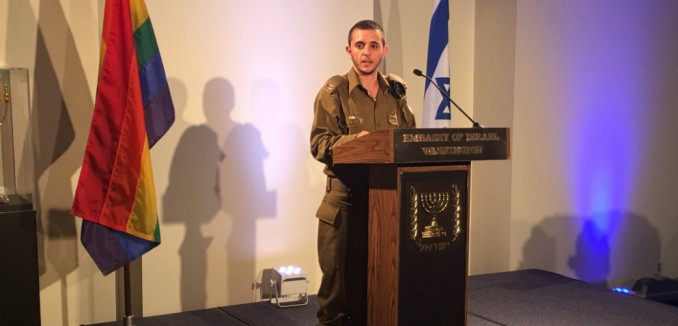As the United States Armed Forces begins to incorporate transgender soldiers into its ranks, the Pentagon is looking to Israel for how to handle the process, Time reported Tuesday.
It will take about a year for the Defense Department’s new policies to be implemented, Pentagon spokesman Eric Pahon said. In the meantime, Israel will be one of the countries looked to for solutions on, among other things, “how to handle some of the shower situations, and what to do about sleeping arrangements,” Pahon said. “We’ve got a lot of training to do for troops already in the military.”
Transgender Israelis’ experiences were rocky at first, as Time recounted. Guy Tiram came out as a transgender man after high school, but hadn’t yet undergone a gender change operation when he was drafted. When he went in for his induction, the receiving officer, seeing a man, sent him to have his hair shaved and gave him a male uniform. But a commander who saw him changing sent him to the female dressing area and gave him a female uniform.
Throughout his army service, Guy was subjected to degrading treatment that hurt his morale, and eventually quit the army. Despite his negative experience, Guy’s treatment turned out to be a turning point in the way the Israel Defense Forces engaged with transgender soldiers.
Today, soldiers like “Amy” (who asked that her real name not be used) have no doubts that they will be accepted in the army—a change from when she was rejected by her religious family after she came out. Amy opted to join the co-ed Caracal combat unit that patrols the border with Egypt. Her fellow soldiers “were empowering,” Amy said. “The girls and guys in my platoon were so sweet and supportive, and all the staff tried to make it as smooth as possible. I didn’t even notice.”
In addition to addressing her as a female, giving her a female uniform, and letting her keep her long hair, the army allowed her to sleep in the female quarters and to shower separately. The army also paid for her hormonal treatments, as it covers the medical expenses of all its soldiers, including sex change procedures.
In February, the IDF changed its Women’s Affairs Department to the Gender Affairs Department, which serves as a round-the-clock resource for any gender-related questions.
“If you’re a commander in the field, you’re not necessarily going to know how to treat a transgender soldier,” said Lt. Col. Limor Shabtai, the IDF’s Deputy Head of Gender Affairs. “Most of the commanders are just afraid of the issue because they know nothing about it. Once we give them educational tools to help them integrate them, things are going much better.”
Commander can get guidance on how to address the needs of transgender soldiers including where they should sleep and shower, how to address them, which uniform they should receive and what medical assistance they need to effect their transitions.
The guidance, according to Shabtai, “has given the commanders a sense of how to deal with the issue.” Soldiers also receive sensitivity training to learn how to properly treat their transgender comrades.
In addition, veteran transgender soldiers look out for newcomers. A transgender soldier named Liam was asked last November to make sure that new transgender recruits were being treated properly. He was pleasantly surprised to observe that the army was treating a new recruit—Amy—as a woman, and “that they’d written her preferred female name next to her original name.”
“She’s the only one to start as openly trans and end as openly trans,” Liam said. “It’s like a revolution.”
In June, the first openly transgender officer in the IDF spoke at an LGBT pride event hosted by the Israeli embassy in Washington. A month earlier, Ta’alin Abu Hanna, a 21-year-old Catholic Israeli-Arab, was crowned the first winner of the Miss Trans Israel pageant.
“If I had not been in Israel and had been elsewhere—in Palestine or in any other Arab country—I might have been oppressed or I might have been in prison or murdered,” Abu Hanna said at the time. “Our country allowed me, a Christian Arab from Nazareth, to end the war between my soul and my body.”
The Hague Center for Strategic Studies ranked the Israeli military as the eighth most friendly to LGBT recruits in the world in 2014.
For more on Israel’s strides in granting rights to its LGBT citizens and residents, read The Persistent Progress of Israel’s LGBT Community, in which Corinne Berzon discusses the advances LGBT individuals in Israel have made in gaining mainstream societal acceptance, and the challenges their community continues to face.
[Photo: Ron Kampeas / Twitter ]




